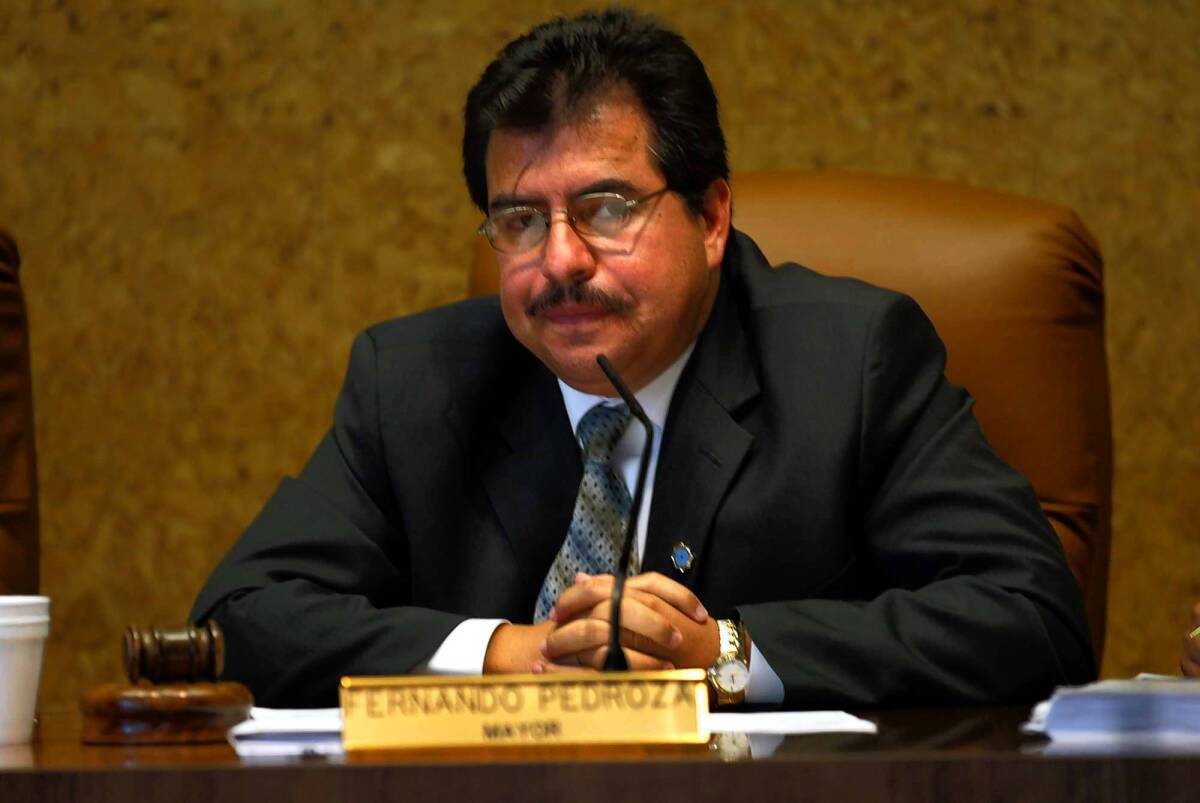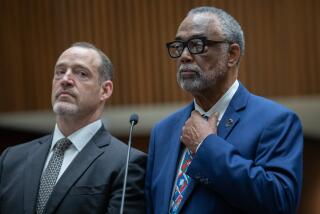Lynwood corruption trial closely watched

For years, prosecutors say, Lynwood council members lived large on the working-class city’s dime.
They allegedly billed the city for trips to far-flung places, including Beijing, Bermuda, Rio de Janeiro and Puerto Vallarta.
One councilman charged his city credit card to watch Playboy channel movies at a Washington hotel. Another got a $100 daily allowance from the city to play in golf tournaments and attend a Tony Bennett concert and also used his city credit card for a $193 dinner at the House of Blues, prosecutors say.
Among the most salacious bills: a $1,500 night out at a Guadalajara strip club, where dancers allegedly performed sexual favors for a council member and city manager — all charged to the city.
But the most far-reaching allegation may well be the most mundane raised so far during the ongoing trial of two former Lynwood council members: that they didn’t earn their salaries. Prosecutors say Louis Byrd and Fernando Pedroza broke the law by paying themselves tens of thousands of dollars each in stipends to sit on city commissions that appeared to do little, if any, work.
The contention has turned the Lynwood corruption trial into a test case for the Los Angeles County district attorney’s office, which has never made such a legal argument before a jury but is expected to do so again in its case against former council members in the city of Bell, who are also charged with misappropriating public funds.
Experts on municipal law and public corruption agreed that the prosecution’s arguments are venturing into uncharted legal territory. Public corruption cases, they say, more commonly involve accusations of shaking down developers for bribes, laundering campaign contributions or taking reimbursements for expenses unrelated to city business rather than whether officials actually earned their pay.
“That’s novel,” said Loyola Law School professor Laurie Levenson, a former federal prosecutor. “We probably could say that about many public officials.... I actually think that’s going to be a kind of challenging case to make.”
The Lynwood council members collected what sometimes amounted to $450 per minute for meetings of the Lynwood Public Finance Authority, which deals with bonds and financing for city projects, and Lynwood Information Inc., a nonprofit that put out a newsletter about the city and managed public access television programs. Both entities were made up exclusively of the City Council’s members and usually held commission meetings at the same time as regular council meetings.
The added pay boosted the part-time council members’ income from less than $10,000 a year to as much as $112,000 in one year for Byrd and $72,000 for Pedroza, prosecutors said.
Deputy Dist. Atty. Ed Miller said the extra salaries were illegal because sitting on the commissions was part of the council members’ required job duties and did not warrant extra pay.
Similar charges have been leveled against council members in the city of Bell, where stipends for sitting on various commissions — in some cases for meetings that never took place or lasted only minutes — boosted the annual pay of most of the council members to nearly $100,000. That case, which Miller is also prosecuting, is expected to go to trial in the fall.
Stanley Friedman, a defense attorney representing former Bell Mayor Oscar Hernandez, said he will be watching the outcome of the Lynwood trial.
“I think potentially it could be a test balloon as to what could happen in the Bell case,” he said. “It could be that a different jury would have a different result, but I do think it’s an important case.”
The district attorney’s office has an inquiry open into similar allegations relating to commission salaries in the city of Compton.
Defense attorneys for the former Lynwood council members have argued that the salaries were legal because the commissions conducted important city business.
Byrd, an 80-year-old retired school principal, told The Times after he was criminally charged in 2007 that “they could never pay you enough” for all the hours the Lynwood council members put in.
The defense also took a cue from a California Supreme Court decision last year that held that public officials must know or be criminally negligent in not knowing that their conduct was illegal in order to be guilty of misappropriation of funds.
Byrd’s attorney, Tomas Requejo, said his client and the other council members had no legal training and relied on a succession of city managers and city attorneys to tell them what was allowed. Albert Robles, Pedroza’s attorney, said some residents had complained about the commission salaries to the district attorney’s office when they became aware of the stipends but were told they were legal. The district attorney’s office said it had no record of such a complaint.
Miller dismissed the idea that the council members were ignorant.
“You had to know. You just don’t make that kind of money in local government,” he told The Times.
For years, the council members sat on the commissions without receiving extra pay. Then, a few days after Christmas in 1998, they held back-to-back meetings of the two commissions, lasting just a few minutes total, during which they voted to request pay of $450 per meeting for each of the bodies.
But they never formally voted as City Council to approve the new compensation for themselves, an oversight that also makes the payments illegal, prosecutors said.
“They never asked themselves for this raise in public, it was never voted on — and even if it had been passed by the City Council, it would have been illegal,” Miller told the jury in his opening statements.
With the new pay scale in place, prosecutors said, council members began holding commission meetings dozens of times a year, rather than the handful of times as in the past, with many lasting five minutes or less.
In 2005, the state Legislature passed a law limiting the pay council members can receive for sitting on such commissions. Bell moved to become a charter city soon after the law was passed, possibly in a bid to circumvent the limits.
Robles said that because the commission stipends in Lynwood predated the 2005 law, they were legal.
“If there’s a bill introduced to close the loophole, doesn’t that tell you there’s a loophole?” he said.
Prosecutors charged Pedroza, Byrd and three other former council members in 2007. The criminal charges fueled a recall effort that removed four council members, including Pedroza and Byrd, later that year. The charges against two others were later dropped. A third, Arturo Reyes, pleaded guilty to one count of grand theft.
The outcome of the Lynwood trial, experts said, will influence the strategy in the Bell case and could serve as a warning to public officials across the state.
“I think other [public agencies] are going to take a look at the pay they are receiving and see whether they think it’s appropriate,” said Bob Stern, former president of the defunct watchdog group Center for Governmental Studies.
More to Read
Start your day right
Sign up for Essential California for news, features and recommendations from the L.A. Times and beyond in your inbox six days a week.
You may occasionally receive promotional content from the Los Angeles Times.







